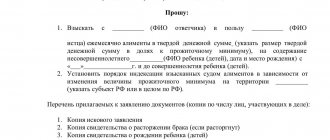The satisfaction of the claim or refusal is explained by the fact that the interests of children who have not reached the age of eighteen are considered a priority. The court also takes into account the circumstances of the payer and recipient of alimony payments. In this case, the preconditions that forced the citizen to file such an application in court are taken into account.
As can be seen from the above, the situation is quite complex and this review will focus on the issue of judicial practice in Russia for 2020.
For all related questions, you can contact the legal experts of the portal. Consultation for Russian citizens is free.
Legitimate reasons for reducing alimony
According to the terms, the amount of alimony payments is set as a percentage of monthly income.
The same article allows for the possibility of reducing or increasing the percentage depending on the situation. There is no clear list provided, but, as a rule, the basis is a deterioration in the financial situation. When making a verdict, the court examines each situation individually. Grounds for reducing alimony:
- Significant decrease in income. The judicial authority examines the payer’s circumstances, reasons and level of current earnings. Sometimes a man quits his job and gets a job with less money to save on alimony. Such situations are quickly calculated.
- The need to support dependents. The basis for reducing payments is the appearance of elderly parents or a pregnant spouse in need of care. To reduce alimony costs, it is necessary to submit evidence to the court, including the impossibility of making payments in the same amount.
- A sharp increase in income. The situation is the opposite, when the payer’s salary increases and 25% per child turns into a large amount, significantly exceeding the child’s needs.
- A serious illness that led to loss of previous ability to work. A reduction in payments is possible if the payer's disability (first or second group) is determined. Attention is drawn to the need to purchase medications, treatment costs, etc. The courts accept disability as a basis for changing the amount of alimony, because this really affects their financial situation.
- Expanding a new family. The court may cooperate due to the birth of a child from another woman. A man has a new dependent, which leads to an increase in financial burden.
- The child gets a job. When considering a case, the amount of income, type of activity and other factors are examined.
- Transfer of a minor to full funding from the state. Payments can be reduced if the child stays all day in an orphanage, boarding school or other special institutions.
Important! Regardless of the circumstances, the alimony payer is obliged to support the request for a reduction in payments with evidence. Otherwise, the court leaves the request without satisfaction.
Legal grounds
In order to prove legal grounds, it is important to provide originals and attach notarized copies of supporting documents to the statement of claim.
Despite the legality of the latter circumstance, there are cases in practice in which the court does not take into account a small level of income.
Such a refusal to reduce the amount of alimony has been the practice of law for the last few years.
Absolutely illegal in its essence, the court motivates the decision to refuse such cases by the fact that the plaintiff did not provide evidence that he cannot receive more. In other words, a certain “presumption of high income”. That is, any person is able to receive a high income in any case, regardless of personal qualities, professional abilities, the level of unemployment in the country and other significant factors.
The legislative framework
Issues of reducing alimony are regulated by the provisions of the Tax, Family, Civil and Civil Procedure Codes. The implementation of court decisions is regulated by the Federal Law of the Russian Federation “On Enforcement Proceedings”. An important role is played by the review of judicial practice on alimony, approved by the Plenum of the RF Armed Forces on May 13, 2015.
What documents are needed to change the amount of alimony?
When parents agree amicably on money paid for the needs of their children, they back this up with a notarized agreement. Otherwise, you will have to solve the problem in court. You must provide the court with:
- statement. To compile it, it is more efficient to use the services of professional lawyers;
- copies of the document on marriage and its dissolution;
- copies of children's birth certificates;
- copies of documents confirming that the parent pays child support;
- documents and certificates helping to establish the legitimacy of the plaintiff’s claims.
Copies must be notarized.
The reduction in alimony is confirmed by a court decision with a writ of execution or a court order. Until these documents come into force, the amount of child benefit paid does not change.
When is it possible to reduce payments?
The law allows for a reduction in the amount of alimony payments if certain conditions are met. Namely, the parties’ financial/family situation has changed. The court may also take into account other significant circumstances that occurred in the life of the alimony payer - Art. 119 RF IC. Such as:
- The appearance of other minor/disabled adult children, as well as other dependents.
- Reduced income/job loss.
- Deterioration of health.
- Insufficient funds after paying alimony to meet the vital needs of the family.
- The occurrence of disability due to age/health.
You can reduce alimony:
- By concluding a notarial agreement on the payment of alimony / making changes to it - this is possible if the recipient is not against such a solution to the issue and is ready to make concessions.
- In court - the most common option in practice, which is implemented in two ways.
First way. If alimony is paid under an agreement and the ex-wife refuses to make changes to it voluntarily, a claim should be filed to change the terms of the agreement, and not to reduce payments.
Second way. If alimony is paid pursuant to a judicial act (decision/order), file a claim to reduce its amount.
Important! When considering cases of reducing the amount of alimony when the financial/family situation of the parties changes, the application of clause 2 of Art. 81 of the RF IC is erroneous, since it regulates the possibility of reducing shares when assigning payments in court. It is necessary to be guided by Art. 119 RF IC - Section VIII of the Review of Judicial Practice of the RF Armed Forces.
See also:
What is meant by change in marital status?
A change in marital status means the addition of dependents to your family whom you are required to support by law. If, after establishing alimony for the first minor, you had one/several children or adopted a child, this will be the basis for reducing payments in court.
If you also have other dependents, you must indicate this circumstance in the claim. Please note that such payments must be established by the court/alimony agreement.
Other persons whom the payer is obliged to support by law include:
- Disabled adult children.
- Disabled parents.
- Disabled needy spouses, including former spouses who became disabled before the dissolution of the marriage or within a year after its dissolution.
- Spouse during pregnancy and for 3 years from the date of birth of their common child. In this case, the marriage must be officially registered or the baby must be born no later than 300 days from the date of divorce.
- A needy spouse who takes care of a joint disabled child until he reaches the age of 18 years/a disabled child of Group I since childhood.
What is taken into account by the courts when analyzing the financial situation
When determining your financial situation, the court takes into account not only the size of your salary, but also all sources of income:
- From entrepreneurial activity.
- From the results of intellectual activity.
- Pensions/benefits/additional payments/bonuses/various compensations.
In addition, any property you own is taken into account:
- Real estate.
- Vehicles.
- Luxuries.
- Securities/shares in authorized or share capital.
- Deposits in financial institutions.
What grounds cannot be used to reduce payments?
In judicial practice, there are a number of reasons that do not allow the client to count on a reduction in alimony. Let's highlight the main ones:
- Intentional leaving a job or transferring to a lower-paying position.
- The appearance of real estate or movable property in the possession of a minor.
- Increasing the ex-spouse's income.
- Taking out loans or developing other types of debt.
- Receiving benefits, pensions or other preferences from the state for minors.
If a man relies on such grounds in his statement of claim, he will most likely be denied.
Wrong reasons
The most common mistakes when applying to judicial authorities for protection is to indicate the following facts as justification.
- Having two or more children. Many alimony payers believe that if they have or become responsible for providing for their other children, they have the right to demand a reduction in the amount of alimony. However, the court is unlikely to take this into account.
- The increase in the financial security of the ex-spouse also has no relation to the alimony paid. Even if the income of such a spouse exceeds the income of the payer several times. Alimony obligations do not depend on this.
- Debt of alimony. Suppose the payer has not paid for a long time and has accumulated a significant debt. No judge will accept such a reason as a legal basis.
- It also does not matter whether the payer has debts to third parties or issued mortgages and loans. The obligation to pay alimony in any case has unconditional priority over them.
- Deterioration in health that does not result in loss of ability to work. This circumstance is unimportant. The main thing is the fact that the source and amount of income, as before, remains at the same level.
How is the amount of alimony determined?
As noted above, in the settlement agreement the amount of payments is specified exclusively by the interested parties - former spouses, parents. It is worth paying attention to the fact that the amount of alimony established in such an agreement should not be less than that provided by law.
In situations where ex-partners resort to the help of the court, the amount of alimony is set by the judge taking into account the level of income of both parties, their material well-being, type of salary, regularity of employment and additional factors.
In what cases is it possible to reduce alimony?
Nothing is stable, especially your income and financial situation. That is why judicial practice provides for the possibility of revising the amount of alimony downward. Such a turn of events rarely pleases alimony recipients, and is often desired by alimony payers. When can a judge make a positive verdict regarding a request to reduce alimony?
- Receiving the first or second degree of disability, which requires additional maintenance costs - for example, hiring a nurse or purchasing medicines and necessary “equipment”;
- The emergence of new dependents into care, for example, incapacitated close relatives or a newborn child in a new family;
- A sharp decrease in wages, deterioration in financial well-being and the inability to get a job;
- Opening a child’s own business if he has reached the age of 16, and this income partially or fully covers the expenses for his needs;
- Other factors affecting the ability to repay money in the same amount.
It is worth understanding that if there is insufficient argumentation, the court has the right to refuse to reduce alimony.
Appeal and cassation
If the court has decided to reduce alimony, you can file an appeal within 30 days, and a cassation appeal within 6 months. Both documents indicate:
- name of the higher judicial authority;
- information about the participants in the process;
- name of the claim (appeal/cassation complaint);
- description of the circumstances - amount of alimony, evidence of the parties;
- reasons for disagreement with the decision of the lower court;
- references to legal norms - RF IC, RF Code of Civil Procedure;
- request to study and review the court verdict;
- attachments in the form of evidence in the case;
- date and signature.
The appeal is considered only if there is evidence of the woman’s arguments. After considering the case, the court cancels the decision or does not change anything in the decision.
What to do if your request for alimony reduction is denied?
In such cases, the court turns out to be very demanding of the plaintiff’s arguments, and often refuses due to insufficient persuasiveness. Thus, the amounts will not be reduced; if you ask for a reduction in child support due to loans, mortgages or additional proceedings that do not concern the child, the judge will deny the request. Of course, the plaintiff has the right to challenge the court’s decision and file an appeal, but in this case the alimony obligations are not removed. To avoid debt and subsequent penalties (such as penalties), the payer must continue to pay the required amounts until the judge decides on a reduction. Remember that accusations of misuse of funds by the recipient must receive strong justification and evidence, otherwise they will simply not be considered in the case.
On appealing court decisions
If the court refuses to satisfy the claim, then the complaint is filed through the same court within a month from the date of the decision in final form. The Court of Appeal considers the complaint after the expiration of the period established by law for filing a complaint within two months. Typically, appeals against such decisions end in victory for the plaintiff. Therefore, if the court of first instance refused to reduce the amount of alimony, it is advisable to appeal. It is also worth remembering that when satisfying demands for a reduction in alimony payments, the defendant also has the right to file a complaint. In this case, it is imperative to prepare a reasoned objection, which can help avoid the reversal of a positive decision.
How to file an objection and counterclaim
The success of the defense depends on the correctness of the documents and the ability to submit them within the deadline established by law.
Objection to the claim
If false or unreliable information is discovered in a claim for a reduction in payments, a woman has the right to file an objection. It is transmitted in two ways:
- orally - information is recorded in the court record with subsequent review;
- in writing - in the form of a document attached to the case materials.
To increase your chances, it is recommended to submit your objection in writing. The law does not provide for strict requirements for drawing up a document, so when filling it out you can adhere to general principles.
Please provide the following information:
- name of the judicial structure and number of the case under consideration;
- information about the parties to the proceedings (full name, place of registration, contacts);
- Title of the document;
- description of the reason for the objection, evidence, indication of violations;
- reference to paragraphs or sections of laws;
- list of attached evidence.
At the end of the document, put the date of execution and sign.
Counterclaim
According to the law, a woman has the right to file a counterclaim and thereby protect herself from a reduction in alimony. Conditions for filing a claim:
- compliance with the norms of the Code of Civil Procedure of the Russian Federation, Art. 131 and Art. 132
- submission to the address for consideration of the main application;
- transfer before or after a decision on the man's claim;
- joint consideration of two documents;
- in the latter case, a general verdict is rendered.
According to Article 138 of the Code of Civil Procedure of the Russian Federation, the court accepts a counterclaim in a situation where the statements are related. For example, satisfying a woman’s appeal may lead to a refusal of a claim to reduce alimony.
Filing a counter-complaint allows you to save time on proceedings, immediately resolve controversial issues and obtain a fair court verdict. In addition, with such actions there are higher chances of concluding a peace agreement and avoiding challenging a court decision. The downside is that the proceedings may drag on indefinitely.
The principle of drawing up a counterclaim is the same as the main claim. It states:
- the name of the court hearing the main claim;
- information about the applicant and respondent (contacts, address, full name);
- Title of the document;
- the plaintiff's arguments and demands;
- references to legal norms, substantiation of the position;
- counterclaims;
- list of attached documents (evidence).
The final touch of the document is the date of its execution and the signature of the applicant.
After filing a counterclaim, the court prepares the case for consideration and sets a hearing date. At the meeting, the positions of both parties and the documents attached to the claim are studied. If no settlement is reached during the proceedings, a verdict is rendered.
Based on the results of the consideration, the court gives a positive decision on one application and denies the other or partially covers both claims. If the mother's counter-petition is denied, she has the right to file an individual claim.
Position in most cases
Alimony is a type of financial assistance to disabled or needy persons: minor children, mothers raising a child on their own, disabled relatives or parents who cannot provide for themselves due to age. The most frequent and significant disputes regarding child support arise between the parents of a joint child. In this case, the parent with whom the child remains to live has to seek help from the other by collecting alimony through the court. Payments are assigned as a share of the payer’s earnings or in a fixed sum of money.
If an agreement is reached between the parents of a minor regarding payments, then payments can be legally secured through a voluntary alimony agreement certified by a notary. In this case, reducing the amount of payments by mutual agreement will also not be difficult - you just need to conclude an additional agreement. However, if the payer who makes payments according to a court decision wants to reduce payments, then the recipient of alimony will not always meet the other party halfway and will defend his position and the interests of his child in every possible way. Practice in cases involving alimony disputes shows that courts can be guided by different beliefs: some refuse to reduce payments to the payer, protecting the interests of the child, others reduce alimony based on the unsatisfactory situation of the payer or the appearance of a new family.
The birth of another child
The fact that the payer has children in his new family will not in itself be grounds for reducing alimony for a child from his first marriage.
According to the court, alimony payments are established as follows:
- for 1 child – a quarter of earnings;
- for two children - a third of income;
- after the birth of a third or more child – half of the income.
These shares may be changed at the discretion of the court if the parties to the dispute submit significant evidence, for example, about illness or dependents.
If a man pays alimony for one child in the amount of 1/4 of his income and the court assigns him alimony for a newborn from another mother in the same amount, then the payer can apply to the court to reduce payments, because the law provides for the deduction of 1/3 of income for two children.
Examples
Let's consider the case of reducing child support based on the presence of other children. The plaintiff asked to reduce payments for a child from his first marriage from 1/4 to 1/6, since he had a child from another marriage. The court refused because, taking into account deductions, the financial situation of each member of the plaintiff’s family exceeds the amount of payments for the first child.
Another case. The plaintiff requested a reduction in alimony, as arrears had arisen due to dismissal and loss of documents for employment at a new job. The court rejected the claim because it was established that at the time of consideration of the case the applicant was working and receiving a stable income.
Sample claim
To the magistrate of the judicial district No. of the city district Address: Plaintiff: Your full name Address: Your address Defendant: Full name of the ex-wife Address: address of the ex-wife Defendant: Full name of the legal spouse Address: address of the legal spouse Claim price: rubles State duty: rubles
STATEMENT OF CLAIM
on reducing the amount of alimony previously established by the court for the maintenance of minor children
year, the magistrate of the district No. of the city issued a court order, which imposed on the Plaintiff the obligation to pay alimony in favor of the Defendant 1 full name for the maintenance of a minor child - daughter/son (name) year of birth in the amount of ¼ of the income monthly, starting from one year until the child reaches the age of 18. year, the magistrate of the city district issued a court order (court decision) to collect alimony from the Plaintiff in favor of the Defendant 2 full name for the maintenance of a minor child - daughter/son (name) year of birth in the amount of 1/4 of the debtor’s monthly income, starting from one year until she (his) comes of age. In accordance with paragraph 2 of Article 81 of the Family Code of the Russian Federation, the court may reduce the amount of alimony collected for minor children in proportion to earnings. Paragraph 1 of the above article states that alimony for minor children is collected by the court from their parents monthly in the amount: for one child - one quarter, for two children - one third of the income of the person obliged to pay alimony. Thus, the satisfaction of the request of the Defendant 2 Full Name for the collection of alimony for the maintenance of a minor child 2 daughters/son (name) year of birth in the amount of 1/4 of the Plaintiff’s income, taking into account the already collected alimony in favor of the Defendant 1 Full Name for the maintenance of a minor child 1 – daughter / son (name) year of birth in the amount of ¼ of the income in accordance with the court order from the year in the aggregate leads to the recovery from me of 50% of my monthly salary for the maintenance of two children, which will significantly violate my legal rights and interests, as well as established by law (Article 81 of the RF IC) the amount of alimony for the maintenance of two minor children is 33% of the income of the person obliged to pay alimony. In connection with the above, I consider it appropriate to file a claim against Defendant 1 and Defendant 2 to reduce the amount of alimony for the maintenance of minor children previously established by the court from the year (date of the 1st order) and from the year (date of the 2nd order) for the maintenance of minor children Name of the child born in the 1st year of birth, Child's name 2 years of birth from ¼ to 1/6 share of the debtor's income for each child monthly. In accordance with Article 119 of the RF IC, if, in the absence of an agreement on the payment of alimony, after the amount of alimony has been established in court, the financial or marital status of one of the parties has changed, the court has the right, at the request of either party, to change the established amount of alimony. When changing the amount of alimony, the court also has the right to take into account other noteworthy interests of the parties. According to paragraphs. 6 hours 1 tbsp. 91 of the Code of Civil Procedure of the Russian Federation for claims for a decrease or increase in payments and distributions, the price of the claim is determined based on the amount by which payments and distributions are reduced or increased, but not more than for a year.
The plaintiff asks the court to reduce alimony for the maintenance of minor child 1, name of year of birth, and for the maintenance of minor child 2, name of year of birth from 1/4 of income to ⅙ of income for each child
Insert your calculation from point 8.
In accordance with Art. 333.19 of the Tax Code of the Russian Federation for cases considered by magistrates, the state fee when filing a statement of claim for a claim price of up to 20,000 rubles is 4 percent of the claim price, but not less than 400 rubles. Taking into account the above and guided by Art. 91, 131, 132, Code of Civil Procedure of the Russian Federation; Art. Art. 81, 119 of the Family Code of the Russian Federation
I ASK THE COURT:
1. Reduce the amount of alimony collected for the maintenance of minor child 1 - daughter/son (name) year of birth, established by a court order from the year No. of the district of the city in favor of Defendant 1 - daughter/son (name) of the year of birth in proportion to the debtor’s earnings from ¼ from income to ⅙ part of the income of the Plaintiff's full name. 2. Reduce the amount of alimony collected for the maintenance of minor child 2 - daughter/son (name) year of birth, established by a court order from the year No. of the district of the city in favor of Defendant 2 - daughter/son (name) of the year of birth in proportion to the debtor’s earnings from ¼ from income to ⅙ part of the income of the Plaintiff's full name. 3. To prepare the case for trial, I ask the court:
- to request from the justice of the peace No.___ district of the city ___ the materials of the civil case on the application (claim) of the Defendant 1 Full name to the Full name of the Plaintiff for the recovery of alimony for the maintenance of a minor child 1 - daughter/son (name) year of birth in the amount of ¼ part of the income monthly, starting from one year until the child reaches the age of 18.
- to request from the magistrate no. district of the city the materials of the civil case on the application (claim) of the Defendant 2 full name to the full name of the Plaintiff for the recovery of alimony for the maintenance of a minor child 2 - daughter/son (name) year of birth in the amount of ¼ of the monthly income, from one year until the child reaches the age of 18.
Date Signature/signature transcript
Applications:
- receipt of payment of state duty;
- copies of the statement of claim according to the number of persons involved with attachments (3 copies);
- certificate 2 personal income tax for ___ year;
- certificate 2 personal income tax for ___ year;
- a copy of the court order dated one year;
- a copy of the court order dated one year;
- certificate from the accounting department about withheld alimony.
A change in the financial situation of parents in itself is not a basis for reducing the amount of alimony
The plaintiff indicated that he was required to pay alimony for his son in a fixed amount, and according to another court decision, ¼ share of the earnings for his daughter from his first marriage was paid. He referred to a change in his financial situation (salary of 10,000 rubles and his elderly mother being dependent on him). He asked to reduce the amount of child support for his son.
The court rejected the claim, stating that
- the amount of alimony paid by the plaintiff in a fixed amount for her son was lower than the minimum subsistence level established for children in the Oryol region;
- The plaintiff’s receipt of income in the amount of 10,000 rubles was not a basis for reducing the amount of alimony, since the plaintiff did not provide evidence to the court of the impossibility of the plaintiff receiving a higher income (presence of illness, disability).
- the arguments about the plaintiff’s dependent elderly mother are untenable, since the pension received by his mother exceeded the minimum subsistence level for persons in this category.
A change in the financial situation of the parents in itself cannot limit the child’s right to necessary and decent maintenance and is not an unconditional basis for reducing the amount of alimony, since it is necessary to establish that such a change does not allow the person obligated to pay alimony to maintain the payment of alimony in the same amount.
In the above example, one cannot help but pay attention to the utter absurdity of the following argument: “the plaintiff’s receipt of an income in the amount of 10,000 rubles was not the basis for reducing the amount of alimony, since the plaintiff did not present evidence to the court of the impossibility of the plaintiff receiving a higher income (presence of illness, disability)” .
That is, from this conclusion it follows that if the alimony payer does not have a disability or serious illness, then he must have a “high income”? And in general, what rules of law, in the opinion of the judge, oblige a citizen to have an income of at least a certain amount? And finally, a non-legal (but very important, relevant argument): is the ability and desire of an ordinary citizen always to work and receive a decent income directly dependent on himself, and not on the authorities who have created an artificial crisis in the country with consequences in the form of a decrease in wages? , inflation and unemployment?
There is a problem with this thesis of the judge also from the point of view of the burden of proof. To support the argument about the real salary, the plaintiff presents to the court, for example, an employment contract, a 2-NDFL certificate. If the defendant disputes the reality of the amount of income of the alimony payer, then it is the defendant who is obliged, in accordance with Article 56 of the Code of Civil Procedure of the Russian Federation, to provide evidence of the presence of real (additional) income and (or) expensive property of the alimony payer, but not vice versa - the plaintiff in a claim for a reduction in alimony does not have to prove that he does not have the opportunity to receive a higher income than he receives at the time the court considers the dispute.
Is it possible to reduce the amount of alimony?
No matter how unpleasant this fact may be for recipients of alimony, the law allows you to change the amount of alimony withheld, not only to increase it, but also to reduce the amount collected.
By virtue of Part 2 of Article 81 of the RF IC, in force as amended since 2019, in the absence of an agreement on the payment of alimony, the recovered amount of shares depending on the number of children can be changed, taking into account the financial and marital status of the parties and other valid reasons .
It is worth noting that the legislator does not focus on in what specific situations the amount of money relied on for child support can be reduced. The court is left with the right to make an appropriate decision taking into account individual circumstances.
If there is a debt
Payers of alimony are not always conscientious, or they may encounter situations that lead to the formation of a payment debt. Judicial practice in the case of debt is slightly different from ordinary proceedings to reduce the amount of alimony. Child support debt can accumulate in cases where the payer violated the frequency of deductions or refused to make payments altogether.
The grounds for such behavior may be valid, because the payer could simply find himself in circumstances beyond his control that prevented payments. To determine whether the reasons for the debt are valid, the court must receive written evidence from the alimony payer. At the same time, if there are grounds for reducing payments, the payer will still need to repay the debt to the recipient of the funds.
The court has the right to prohibit the debtor from traveling abroad or to seize his property. If during the trial it turns out that the payer has serious reasons for the debt, then he can apply for an installment plan for debt obligations. To repay the debt, more than half of the income cannot be deducted from the debtor’s salary. In some cases, the court may release the payer from debt that has accumulated due to compelling reasons, for example, due to a serious illness or temporary disability of the debtor. However, writing off the debt does not mean that the payer is completely exempt from payments in the future.
Arbitrage practice
Each situation is studied individually, so there are no uniform rules for protecting against alimony reduction. In practice, the court accommodates a man halfway when he becomes disabled or has a justified reduction in income. If the payer, for example, quit his job but lives with his new wife in an expensive apartment, the claim will be denied. When considering a case, judges evaluate the following factors:
- level of costs for treatment or training;
- the degree of deterioration in the child’s material security;
- arguments from both sides;
- attached documents;
- position of legislation and judicial practice.
In most cases, the court takes into account the rights of the child and the degree of financial difficulties of the alimony payer.
Judicial practice on reducing alimony: nuances
Court examples on reducing alimony contain rather controversial situations in which the court, based on its internal conviction, decides on the issue of reducing payments.
Among these situations:
- the child support payer takes care of disabled parents;
- the level of income of the child’s family has increased, and the alimony payer has financial problems or the need to provide for other children;
- the alimony payer has a very high income and the amount of payments significantly exceeds the amount of sufficient funds to provide for the child (in this case, the court can calculate 1/4 of the mother’s income and reduce the father’s alimony to the same amount).
In any case, the court must consider the financial situation of both parties together and make a decision that would promote proper financial support and protect the interests of the child, without prejudice to the position of the alimony payer.
Results
The child’s mother should not give up if her ex-husband filed for a reduction in alimony. She has many defense tools in her hands, from filing a counterclaim to filing a cassation appeal. The main thing is to act immediately upon receiving a notification and involve an experienced lawyer for help. He will help in collecting documents and defending his personal position in court.
Each situation with the collection of alimony is individual and depends on a number of factors. We offer a free consultation to help you sort out the main controversial issues. Solve your problem here and now!
Describe your situation to a lawyer in an online chat or write a question in the form below.
Ways to reduce alimony
As one of two possible options, you can enter into a voluntary agreement with a citizen or organization representing the interests of a minor child.
At the same time, it should not infringe on the actual interests of the child and is subject to notarization. In practice, this method is practically not used, since the positions on the issue of reducing payments between the obligated person and the child’s representative usually differ greatly. Therefore, the main way to establish smaller amounts of alimony is through the court. However, litigation does not always guarantee a decision in favor of the payer, because during the proceedings the interests of a minor or an adult in need of assistance provided for by law are affected. Due to the fact that, from a social point of view, the recipient of alimony is a more vulnerable subject, the judge is most often on his side.
Therefore, in the end, a decision is made to refuse to satisfy the claim. This outcome of the case does not mean that the plaintiff automatically loses any opportunity to reduce the amount of alimony in the future.
But it is still better to avoid refusal of the stated requirements. This can be done by knowing the basis for refusing to reduce the amount of alimony and the basis for satisfying the requirements that can be used in court proceedings.
Crib
- Current legislation provides for the possibility of reducing child benefits.
- You can reduce the material content - in shares/flat amount/mixed.
- Reducing the amount of alimony is a right, not an obligation of the court.
- Changing alimony payments under a notarial agreement is possible at any time with the mutual consent of the parties.
- There are no indisputable grounds for reducing alimony payments. The burden of proving the circumstances on which the claim is based rests with the payer.
- Requests for reduction of alimony are subject to consideration by district (city) courts.
Have your friends had to reduce the amount of alimony in court and what reasons did they give? Did the court satisfy their demands?
Penalty
Penalties are penalties for late or non-payment. Collection of debt for a penalty occurs after the recipient of alimony applies to the court or executive service.
If a voluntary agreement on alimony has been concluded, then the penalty is calculated in accordance with its provisions, drawn up at the discretion of the parties. If the penalty is determined by the court, then its value is 0.5% of the total amount of debt for each day of delay.
To collect a penalty, the recipient of payments in a lawsuit must convince the court that the debt arose through the fault of the payer. If the court sides with the debtor, the fine may not be imposed or its amount will be reduced.
What needs to be done to ensure that the claim is not denied?
Firstly, you need to carefully study the grounds for reducing the amount of payments, which are unpromising to refer to. That is, for example, if the alimony recipient decided to justify his difficult financial situation by the availability of loans, then it is better not to waste time and money on initiating a dispute in court.
Secondly, you need to find really worthwhile circumstances, if they exist. And, the most important thing is to justify them. Note that there is no “stronger” or “weaker” evidence, but judges like the parties to present documents during the process. And they don’t really want to take eyewitness testimony into account. Therefore, if the plaintiff’s position is based, for example, on the argument that his health condition has worsened, he cannot work as before, and spends a lot of money on medicines, then you need to collect as many documents as possible indicating this.
In a word, evidence is always needed. And the more there are, the better.










